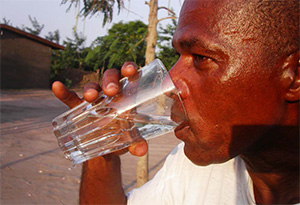
Multiple-use water services (MUS) is a participatory, integrated approach to water management that supports both agricultural production and domestic activities at or near the home. One of its principle strengths is that it overcomes traditional barriers between the domestic and productive water sectors.
MUS has the potential to bridge agriculture and nutrition through water use: enhance crop production and household income, increase access to diverse foods, decrease disease transmission, and empower women and communities through income generation and time and labor savings. Additional nutritional benefits from MUS may be linked to safer drinking water and improved hygiene.
With emerging evidence suggesting that stunting cannot be addressed without also focusing on water, sanitation, and hygiene (WASH), SPRING wanted to better understand current WASH and water strategies that sought to bridge agriculture and health to reduce undernutrition at the community, farm, and household levels.
Pulling on examples from the field, this report highlights some opportunities and challenges around linking MUS to improved nutrition and outlines some promising practices for making MUS more nutrition-sensitive.